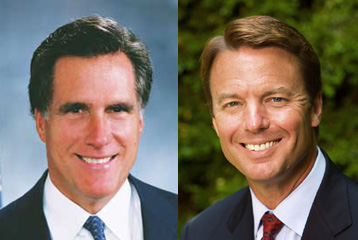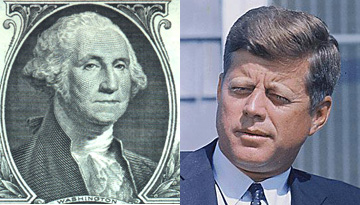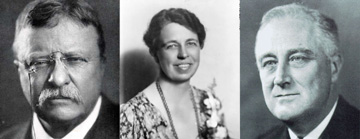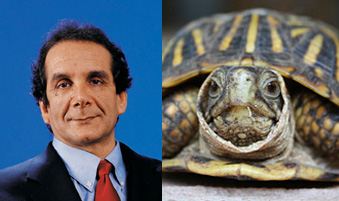First, an enormous orange fireball booms onto the screen. The camera shakes and a crowd runs for cover. Next, sirens wail, as an abandoned car explodes. Paramedics tote bodies away from another blast. Militants raise their AK-47s and parade across the desert, their faces masked.
What’s the next image that fills the screen, in a Web commercial by John McCain that really puts the “attack” in “attack ad”? Mitt Romney’s face, above a quote from a Hannity & Colmes appearance where Romney said “a president is not a foreign policy expert.”
The closer the New Hampshire primary gets, it seems, the more terrified the Republican presidential candidates want you to be. That way, you’ll vote for the guy who scared you the worst, and not that guy who’s going to preside over your death at the hands of jihadists. McCain, who wants to shift the conversation away from immigration and onto foreign policy and security issues, has Web ads like “Experience.” Rudy Giuliani — who never misses a chance to remind voters about 9/11 — is airing a TV commercial in New Hampshire called “Ready” that is even more alarming than McCain’s “Experience.” Released just days after Bhutto’s murder, it features footage of the late Pakistani leader, accompanied by a soundtrack of Middle Eastern music. “Hate without boundaries,” intones a narrator. “A people perverted … A nuclear power in chaos.” Mike Huckabee — no foreign policy maven — answered a press conference question about immigration by invoking the specter of Pakistanis with “shoulder-fired missiles” sneaking across the U.S.-Mexico border. Fred Thompson got into the act at Saturday night’s ABC News/Facebook/WMUR debate, proving that even campaigns that don’t have the money to scare people with ads can still try other methods. “We could be attacked with a biological weapon and not even know it for a long period of time,” Thompson told viewers matter-of-factly. (Now enjoy your late local news.) …
… Ask Republicans about the issue, of course, and they’ll say the only danger in advertisements that focus on terrorist attacks is that they won’t go far enough. “Whether we live or die is obviously the most important issue,” said Rep. Peter King, R-N.Y., an advisor to Giuliani’s campaign and the top Republican on the House Homeland Security Committee.
You readers are from all over the country. Are people where you live really cowering in fear of jihadists? Or are they more worried about their jobs and health insurance?
Apparently they tried illegal immigrant fear mongering — brown people with funny accents will steal your jobs and seduce your women — tactics in Iowa, to little effect. So they’re falling back on brown people with funny accents will blow up your shopping malls.
Paul Krugman writes about fear today, too.
The unemployment report on Friday was brutally bad. Unemployment rose in December, while job creation was minimal — and it’s highly likely, for technical reasons, that the job number will be revised down, showing an actual decline in employment. ..
…It’s not certain, even now, that we’ll have a formal recession, although given the news on Friday you have to say that the odds are that we will. But what is clear is that 2008 will be a troubled year for the U.S. economy — and that as a result, the overall economic record of the Bush years will have been dreary at best: two and a half years of slumping employment, three and a half years of good but not great growth, and two more years of renewed economic distress.
This should be good for Democrats. But then …
But the opponents of change, those who want to keep the Bush legacy intact, are not without resources. In fact, they’ve already made their standard pivot when things turn bad — the pivot from hype to fear. And in case you haven’t noticed, they’re very, very good at the fear thing.
I’m sure you’ve noticed that for the past seven years, conservative bobbleheads have wondered why the American people aren’t more appreciative of the great economy Bush has given them. (Professor Krugman provides some graphs on his blog that tell us why.) Very recently the Bushies have begun to notice the economy may be less than great. And the rhetoric, as Krugman says, has swung from hype to fear.
President Bush is warning that given the economy’s problems, “the worst thing the Congress could do is raise taxes on the American people and on American businesses.â€
And even more dire warnings are coming from some of the Republican presidential candidates. For example, John McCain’s campaign Web site cautions darkly that “Entrepreneurs should not be taxed into submission. John McCain will make the Bush income and investment tax cuts permanent, keeping income tax rates at their current level and fighting the Democrats’ plans for a crippling tax increase in 2011.â€
What “crippling†tax increase, which would tax entrepreneurs into submission, is Mr. McCain talking about? The answer is, proposals by Democrats to let the Bush tax cuts for people making more than $250,000 a year expire, returning upper-income tax rates to the levels that prevailed in the Clinton years.
I wonder if anyone but the entrenched ideological Right is buying this bilge, but we can’t be too careful.
Finally … if Barack Obama wins the Dem nomination we’re going to be spending a lot of time discussing racism in America. But for now I just want to say that if Senator Obama is the nominee, there’s one thing we can count on: The GOP will stop at nothing to prevent African Americans from getting to the polls.
The chief way this is done is to stir up fear of voter fraud, enabling the GOP to apply “remedies” that keep legitimate voters from voting. And in the current New Yorker, Jeffrey Toobin writes that the Supreme Court is about to hear a voter ID law challenge from Indiana, and the decision could have an impact on which citizens will be allowed to vote in the November elections.
“Let’s not beat around the bush,†Terence T. Evans, the dissenting Court of Appeals judge in the Indiana case, slyly wrote. “The Indiana voter photo ID law is a not-too-thinly-veiled attempt to discourage election-day turnout by certain folks believed to skew Democratic.†He’s not the only one to notice: the three federal judges who approved the Indiana law were appointed by a Republican President; the lone dissenter was appointed by a Democrat. It was also Republican-dominated legislatures that produced the Indiana and Georgia laws, both of which were signed by Republican governors.
Who are the “certain folks,†in Judge Evans’s delicate phrase, that the Indiana law is trying to discourage? The best answer can be found in a friend-of-the-court brief in the case filed by twenty-nine leading historians and scholars of voting rights. They concluded that the Indiana law belongs to a malign tradition in “this nation’s history of disfranchising people of color and poor whites under the banner of ‘reform.’ †Such measures as the poll tax and literacy tests, they write, were “billed as anti-fraud or anti-corruption devices; yet through detailed provisions within them, they produced a discriminatory effect (often intended) within the particular historical context.†So it will be in Indiana, where the law creates a series of onerous barriers to voting. Consider one: you can get a government photo I.D. by showing your birth certificate, but you can’t get a copy of your birth certificate unless you can produce certain official photo I.D.s. And, with up to twenty million Americans of voting age lacking government-issued identification, the matter of requiring photo I.D.s has broad implications.
Let’s face it; today’s Republicans hate democracy.




